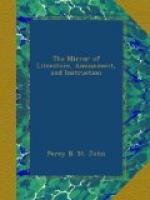Ah! wherefore, did I ask?—Because forsooth,
Their ways are changed with their increasing years!—
For when for gallantry the time be come—
And when the stagnant blood begins to boil
Within the veins, my master—then the lads
Cast longing looks on damosels—for nature
Defies restraint—and kin-birds flock together!—
And think not, Master, Chance disposes thus;
Or were it so, then chance directs us all—
Whene’er we have attain’d the important age!
I, ------, am a living instance!--
Was I not once a lively laughing boy?
And, in my stripling age, did I not love
The pastimes suited to those madcap days?—
Oh! would to heaven those times were present still!
But wherefore fret myself with hopes so vain?—
The silly thought doth find no shelter here,—
That any beauty, with dark roguish eyes,
With sparkling blood, and rising warmth of youth,
Would e’er affect this wrinkled face of mine:—
The very thought doth smack of foolishness!—
And, though the truth may be a bitter pill,
Yet,—
It is most fitting that we know ourselves.
Spanish Comedy—Foreign Review.
* * * * *
A HINT TO RETIRING CITIZENS.
Ye Cits who at White Conduit House,
Hampstead or Holloway carouse,
Let no vain wish disturb ye;
For rural pleasures unexplored,
Take those your Sabbath strolls afford,
And prize your Rus in urbe.
For many who from active trades
Have plung’d into sequester’d
shades,
Will dismally assure ye,
That it’s a harder task to bear
Th’ ennui produced by country air,
And sigh for Urbs in rure.
The cub in prison born and fed,
The bird that in a cage was bred,
The hutch-engender’d
rabbit,
Are like the long-imprison’d Cit,
For sudden liberty unfit,
Degenerate by habit.
Sir William Curtis, were he mew’d
In some romantic solitude,
A bower of rose and myrtle,
Would find the loving turtle dove
No succedaneum for his love
Of London Tavern turtle.
Sir Astley Cooper, cloy’d with wealth,
Sick of luxurious ease and health,
And rural meditation,
Sighs for his useful London life,
The restless night—the saw
and knife
Of daily amputation.
Habit is second nature—when
It supersedes the first, wise men
Receive it as a warning,
That total change comes then too late,
And they must e’en assimilate
Life’s evening to its
morning.
Thrice happy he whose mind has sprung
From Mammon’s yoke while yet unwrung
Or spoilt for nobler duty:—
Who still can gaze on Nature’s face
With all a lover’s zeal, and trace
In every change a beauty.




